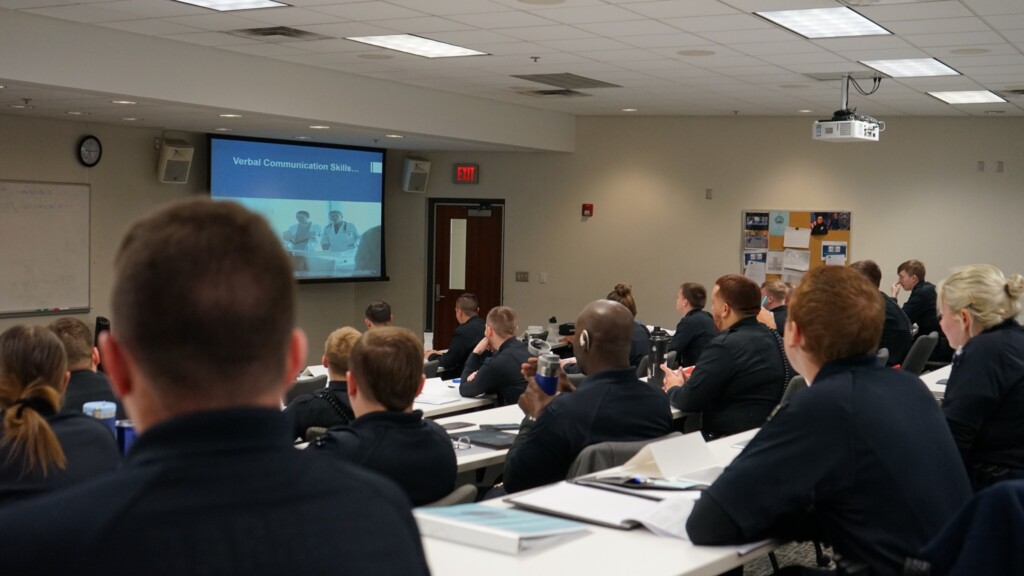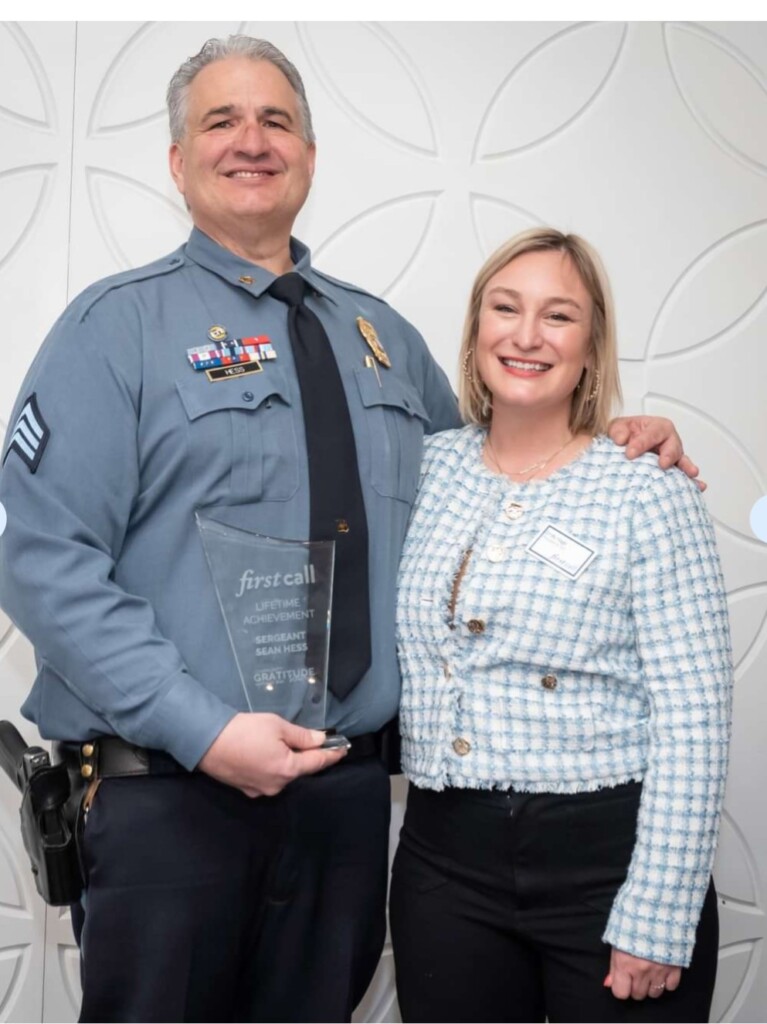The Police Foundation of Kansas City promotes mental health awareness through key initiatives with the Kansas City Missouri Police Department, including supporting the Crisis Intervention Team to equip officers for handling mental health crises effectively. Internally, the KCPD focuses on mental wellness programs for its personnel.
New Soft Interview Room
Sergeant Erica Oldham, a former sex crimes detective with KCPD, spearheaded the department’s journey toward becoming more victim-centered and trauma-informed through a soft interview room. Oldham said the necessity for cozier, more welcoming interview spaces was a necessity for the Department. The stark, sterile rooms of the police headquarters were ill-suited for the sensitive nature of these interactions. They lacked the warmth and comfort essential for survivors to feel heard and supported, as well as the privacy from potential suspects.
“It just made sense,” Oldham said. “What we had was cold, grey rooms with a table and two or three chairs and a whiteboard. For years, we interviewed victims in these rooms.” Oldham added that in one instance, she recalls a survivor crying during the interview, and there wasn’t even a box of tissues in the room.
The Foundation has funded the creation of KCPD’s soft interview room, aimed at providing a more compassionate environment for interviewing survivors of trauma. This initiative, in partnership with Project Beloved, underscores KCPD’s commitment to justice, compassion, empathy, and healing for the community.
KCPD is creating a soft interview room to provide a safe and nurturing environment for survivors to share their stories, in a space with pleasing, comfortable and warm colors on the wall, furniture with soft fabrics, throw blankets, decorative accessories and calming, soothing scents.
Oldham knew the current interview rooms at KCPD headquarters wouldn’t be large enough. A larger space that was being used as a meeting and waiting room was identified as the location for the new soft interview room.
Sergeant Tiffany Davis, who is the sergeant over the unit, has been leading the effort to secure funding for the soft interview room, supported by the Police Foundation. The Foundation’s support, including funding for the necessary electronic elements in the space, reflects a strong commitment to community collaboration and survivor support.
This soft interview room, set to begin transformation this month, emphasizes the well-being and empowerment of survivors. Amenities like weighted blankets and stress balls, along with artwork by Megan Getrum—a victim of violence—provide comfort and a personal touch, reminding survivors that their voices and experiences matter.
This initiative marks more than a renovation for KCPD; it is a pledge to support survivors through compassion and justice. The Police Foundation of Kansas City is proud to support Kansas City’s soft interview room, the first of its kind in both Missouri and Kansas.

An example of a soft interview room from Project Beloved.
Employee Wellness Unit
The Foundation is steadfast in its support of the KCPD’s mental health initiatives, recognizing the critical need to address both external and internal mental wellness. Through the funding of programs like Crisis Intervention Training (CIT) and the establishment of a comprehensive Wellness Unit, the Foundation is helping to transform the way KCPD serves its officers and the community.
KCPD’s Wellness Unit, officially launched in 2017, focuses on holistic well-being, encompassing mental, physical, financial, social, and relational health. The unit offers peer support teams, critical incident debriefings, and daily wellness check-ins. The Foundation’s backing ensures these programs have the resources needed to thrive, highlighting the importance of supporting officers’ mental health to enhance their service to the community. This initiative underscores the Foundation’s commitment to fostering a healthier, more resilient police force, benefiting all of Kansas City.
“We really appreciate the Foundation’s involvement and support in prioritizing our wellness,” said KCPD Employee Wellness Supervisor Rob Blehm. “We’re not too late to the game, and we’re happy that this is in the forefront right now. We’re always looking at how we can attract and retain our department members. This committed group, who serves a critical function in our society, needs your support.”
Crisis Intervention Training
The KCPD’s CIT unit plays a vital role in addressing mental health issues within the community. CIT training includes a wide array of topics, including mental illness, de-escalation techniques, court proceedings and intellectual disabilities, taught by a diverse group of professionals. This comprehensive training equips officers with the knowledge and skills to handle mental health crises effectively, fostering a more compassionate and informed police force.
Although all officers in the KCPD are CIT trained, the CIT unit is staffed with 5 officers and additional full-time support staff. They partner with community behavioral health liaisons to conduct home visits and follow-up on mental health-related 911 calls. These visits aim to connect individuals with resources and services, reducing the frequency of emergency calls and providing ongoing support to those in need.
Beyond home visits, the CIT unit is actively involved in homeless outreach, collaborating with community partners to offer resources directly to the homeless population. They are also part of a broader initiative to develop alternatives to police responses for mental health calls, working on pilot programs that involve community paramedics and mental health professionals. Additionally, the CIT unit contributes to the 988-diversion project, which aims to redirect non-emergency mental health calls from 911 to the appropriate support services.
Training is a cornerstone of the CIT program, and as part of its commitment to the KCPD, PFKC funded a CIT Team Training in March 2023.

Recruits in the 180th Entrant Officer Class receiving Crisis Intervention Team (CIT) training. CIT teaches officers to recognize signs of people with mental illness and how to respond appropriately and with compassion.

Reserve Sergeant Sean Hess receiving the Lifetime Achievement Award from First Call. Hess has spearheaded KCPD’s Crisis Intervention Team (CIT) Unit over the last decade.
In Conclusion
The efforts of the KCPD and the Police Foundation of Kansas City underscore a profound commitment to both the well-being of the community and the officers who serve it. By creating environments that foster empathy and understanding, and by equipping officers with the necessary skills to handle mental health crises, KCPD is setting a precedent for compassionate law enforcement. This holistic approach not only addresses the immediate needs of vulnerable populations but also builds a foundation of trust and resilience within the community.
As we commemorate Mental Health Awareness Month, together, we can create a community where survivors feel heard, believed and empowered—a community where healing is not just a possibility but a collective commitment.
We appreciate your support!

Get Social